Field Biology and Field Geology of the Taiga and Tundra Ecosystems, Brooks Range and Arctic National Wildlife Refuge
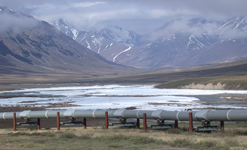
"The ELI course that I participated in has been invaluable. The
staff is a remarkable combination of brilliance, experience, scientific
knowledge, and cultural understanding. To be immersed in this unique environment
has enriched my professional and personal life. Already I have developed
and presented two workshops using inquiry and environmental themes from
this workshop. The First Nations perspectives and a western science grounding
are combined in a setting that is absolutely breathtaking."
Jean Carpenter, 2002 participant in BC TORCH
Outreach Coordinator, Center for Life Sciences, Colorado State University
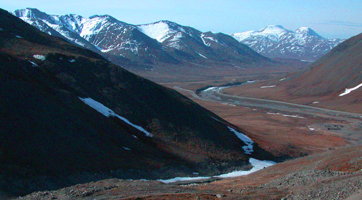
Required Personal Clothing & Gear
National Science Teaching Standards
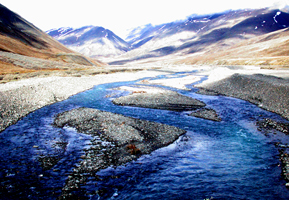
Session 1: August 16- 25, 2004.
Participant Share of Cost (SOC): $1300 plus airfare to Fairbanks rendezvous. (Partial need-based fellowship may be available). Rolling Admissions. $150 non-refundable deposit.
†This Share of Cost (SOC) does not include airfare from the participantís home to and from Fairbanks, personal clothing, personal equipment expenses, personal expenses or optional travel.
Credits:
Option 1. 4 graduate-level relicensure hour credits available through Colorado School of Mines (additional $150). Registration for this credit is done at the completion of the course with payment by credit card or check. All required materials MUST be received by CSM within 2 weeks of completing the course.
Option 2. 2 sciences graduate credits available through New Mexico Institute of Mining & Technology ($360, 2004 fees may rise slightly). Registration for this credit must be completed prior to the course. NMIT registration materials available at www.nmt.edu/~eodi.
PLEASE LET US KNOW IF YOU WOULD LIKE TO COMMUNICATE WITH PREVIOUS PARTICIPANTS!
Rendezvous: 9 AM, August 16, Fairbanks airport.
Dropoff: 9 PM, August 25, Fairbanks airport. Therefore you can book flights for the next day.
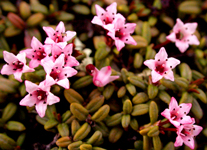
1. Facilitator Contact Information:
David Scott Silverberg, Ph.D.,
520 245-3711, silverberg@alum.mit.edu
Environmental Learning Institute
5710 South Freeman Road #4
Tucson, AZ 85747
Allsion Butler, University of Alaska, Anchorage
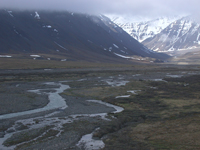
2. Brief Description:
In this TORCH we will explore through authentic inquiry-based learning-research activities the incredible tundra and taiga ecosystems of Alaska's "Brooks Range " and the remarkable Arctic National Wildlife Refuge. August is usually a time of beautiful weather, frequently clear skies. The Brooks Range is composed of spectacular glaciated mountain ranges and incredibly mammal-rich dry and wet tundra ecosystems. Spruce trees, willows, birch, grizzley bears, black bears, caribou, moose, wolves, wolverine, arctic fox typify the region. We will be tent-camping and staying in basic cabins. Our days are filled with field work, our evenings include lively text-based discussions of inquiry-based scientific learning, traditional ecological knowledge, expeditionary learning, team development models, global environmental change.
Educators will:
- Learn about the climate, geology, flora and fauna of taiga and tundra ecosystems.
- Become familiar with global and local threats to these ecosystems.
- Learn the Grinnel system of field journaling.
- Learn a variety of field research techniques that can be applied in the classroom as well as in the field with their students.
- Experience inquiry-based learning first-hand and develop inquiry-based lessons for their own classrooms.
- co-design and co-implement a Participatory Action Research project (with geological and biological components) serving the interests of the local community.
- Be encouraged to establish long-term professional connections with
each other and local experts.
- Participate in professional forums on inquiry-based science, alternative assessment, and constructivist pedagogy in the science classroom.
- Contribute to the creation of a world wide web site that will illustrate the philosophy, pedagogy and experiences of the workshop.
3. Itinerary (This will change due to weather, road conditions and other circumstances of Alaska expeditionary learning):
Days 1-3 The team meets in Fairbanks, Alaska and visits the UAF museum.
We then study northward along the Dalton Highway (the "Haul Road)
enroute to the Gates of the Arctic National Park.
Days 4-6 the team camps in Gates of the Arctic National Park and goes for long day study hiking excursions into the dry tundra of the Brooks wilderness.
Day 7-9 the team will study tour on and hike off of the Dalton Highway northward from Atigun Pass to Toolik along the western margin of the Arctic National Wildlife Refuge.
Day 9-10 Return to Fairbanks
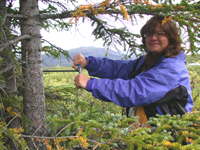
4. Levels of educator-participants:
We invite undergraduate science majors interested in field biology and geology of Alaksa, field science education and learning techniques, intermediate- to secondary-level pre-service, in-service, education undergrad and graduate student, science education professors (teacher of teachers) and science education professionals (e.g. science education coordinators, university, park, museum and outdoor center affiliated).
5. Structure of workshop:
Participants will attend content lectures and guided hikes, undertake
field studies in both taiga and tundra ecosystems. Our days are filled
with field work, our evenings include lively text-based discussions of
inquiry-based learning, expeditionary learning, team development models,
global environmental change.
6. Content Knowledge Topics: Field Geology and Field Biology in the Context of Natural Ecosystems and Ecological Concepts
This course provides an overview of the Alaskan Taiga and Tundra ecosystems: what they are; how they work from a geological and biological perspective; and how they evolve and adapt to change. Ecosystem structure and function are integrated into a central theme of sustainability from a local and global perspective. Particular emphasis will be given to the geology and ecology of the Brooks range. Biosphere, lithosphere, atmosphere interactions and exchanges within the Taiga and Tundra biomes are introduced as related to issues of local and global environmental change. The philosophy, pedagogy and learning activities of the course employ a standards- and inquiry-based approach.
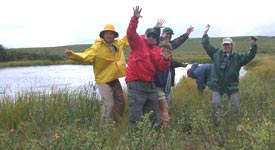
Learning Activity Topics Include:
Environmental History of Alaska
Alaska and Global Environmental Change
Experimental Design and Data Interpretation
Tectonic, Geologic and Physical Geographic Development of Alaska
Mineral and Petroleum Resources of Alaska
Causes and Consequences of Northern Latitudes Biodiversity
Plant and Animal Adaptations to the Far North
Taiga Forest and Tundra Structure & Function
Alaska's Protected Areas and Communities
7. Curriculum materials:
Each participant will also receive a binder in which to put all course
handouts. Included will be readings on global change and current environmental
issues in taiga and tundra ecosystems, both global and local. Maps and
field guides for each field site as well as descriptions of common field
techniques and their applications will also be included. In addition,
teachers will receive handouts regarding pedagogy, ways in which inquiry
based learning may be implemented in the classroom, alternative assessment
(rubrics, portfolios, exhibitions), and constructivism in science education.
8. Field Equipment: Our field lab includes several notebook computers, TI-89 graphing calculators, a full set of Vernier calculator and computer-based laboratory probes and standard geological and biological field equipment. A digital projector, compasses, barometers, digital cameras, mini-DV camcorders, 35 mm SLR, dissecting microscope, GPS units.
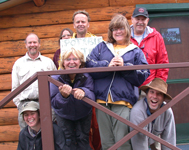
9. Food and Lodging: We will be cooking in a camp and also occassionally eating in simple local restaurants. Participants will be asked to help the camp manager with cooking and cleaning chores in rotation. We will be camping in tents and using sleeping bags. You need to bring your own sleeping bag and sleeping pad. Two person tents are provided, though you are welcome to bring your own if you prefer.
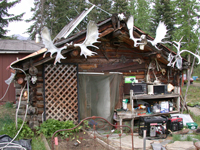
10. Physical Fitness Requirements: The Alaska Brooks Range TORCH course involves hiking in the wet taiga forests, wet and dry tundra, dayhiking with a 20 pound daypack, hiking on trails and off-trails, traveling in a van for several hours on sometimes curvy mountain roads, †traveling in a canoe.† Participants will sleep in tents, in sleeping bags with sleeping pads on the ground.† You must be in VERY GOOD physical condition.